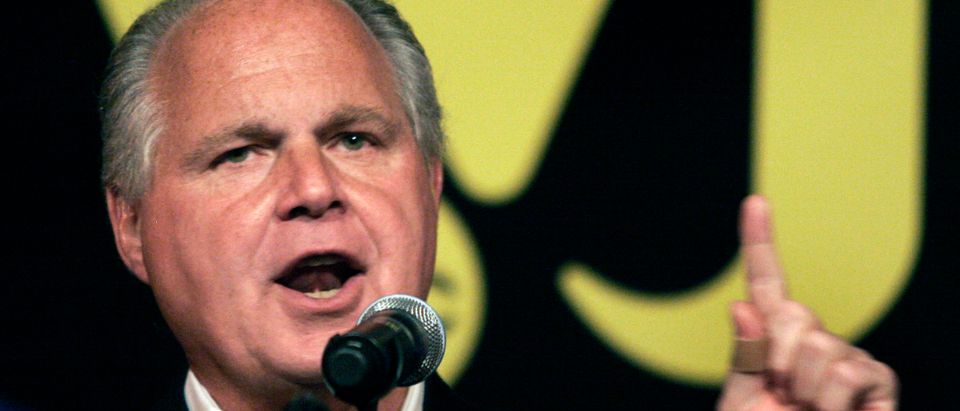Rush Limbaugh was the king of radio, but in the early ’90s, he often seized the late-night TV crown, regularly beating both David Letterman and Jay Leno.
I’m proud that Rush Limbaugh: The Television Show gave me the opportunity to work my way up from an intern filling his humidor with cigars to associate producer. Upon graduating from the University of New Mexico in 1992, I’d flown to New York City and landed on my parents’ couch. I found myself unemployed at peak-David Dinkins, with a job market drier than Hawkeye Pierce’s martini.
Rush always talked about the staff being a family. In my case, it’s literal. In 2000, he hired my brother, Keith, at RushLimbaugh.com. When I’d see Rush, he’d make a crack about Keith, and when he saw Keith, he’d flip the script. In a business where many are told not to make eye contact with the talent, Rush would give you a fist bump.
Getting on TV is an obsession for many, but Rush only had eyes for his first love: radio. It facilitated a deeper connection.
“In the four years I did TV, I can count on one hand the number of times people told me they remembered something I said. But the number of times they commented on my tie were legion.”
Rush had too much respect for James Brown to claim his mantle as “the hardest working man in showbusiness,” but what do you call someone who traveled every weekend but four in two years, promoting EIB at stadium appearances and affiliates? To get on New York’s WABC, he had to do a local show before his national one. Then, as soon as those six hours ended, he raced uptown for hours of TV.
When someone is overworked, they often take it out on those under them, but not Rush. Every Christmas, he gave each of us an envelope stuffed with AMEX checks, which allowed me to play Santa Claus — and move off that couch. He often treated us at Patsy’s Italian Restaurant, always in the Sinatra room and loved to walk people down the Chairman of the Board’s secret staircase to 56th Street.
He gave away so many iPhones, iPads and MacBooks to radio callers that his screeners begged him to stop because grifters were jamming the lines. He raised tons for charities, $40 million plus for the Leukemia and Lymphoma Society alone. In 2006, he left a waitress a $2,000 tip, which was not unusual.
I have logged some 25 years in TV since Rush’s set went dark, and I appreciate his uniqueness more in ’21 than I did in ’92. More typical was our studio neighbor, Sally Jesse Raphael, whose staffers would cry at the corner bar over her petty cruelty. It’s as if Rush was born not just for radio, but for the Golden Age of Radio, when we imagine people were more genuine.
Probably the only part of our shows that Rush really enjoyed was the audience. He’d stay as long as it took to sign every one of his best-selling books, “The Ways Things Ought To Be” and “See, I Told You So” and shake every hand, even after those 14-hour days. He loved and respected people. For example, gotcha man-on-the-street questions are standard across the political spectrum, but Rush vetoed them. “I don’t want the people of this country to appear ignorant.” To Rush, those Upper West Side liberals outside were Americans too.
He wanted to provoke thought, not cheap laughs. So, he had us mine the Reagan Library’s archives and use what we found to draw contrasts with Bill Clinton. Montages like that so frustrated the 42nd president, he called one of the affiliates from Air Force One to complain. These days, they call what Rush did “afflicting the comfortable” and “speaking truth to power.”
Rush had a photographic memory, too. He would watch some video montage a single time and re-edit it in his head. Once, he remembered various times when Clinton had promised to balance the budget in three years, five, six, etc. We strung them together into a parody. Some firm turned it into an RNC commercial and won an award, never once crediting the source.
I know millions wish they could have known Rush personally, but if you heard him on the radio, you knew each other. As he said when announcing his diagnosis on February 3, 2020, “I can see you. It’s strange how, but I know you’re there.”
At the end of some shows, Rush would quote the old performer’s creed: “Always leave them wanting more.” He certainly left us all wanting more, but take heart. He knows we loved him, he loved us right back and he’ll be waiting in heaven to greet you with a fist bump.
And maybe, just maybe, a joke about your goofball brother.
Brian Doherty was a producer for Rush Limbaugh: The Television show from 1992-1996.


